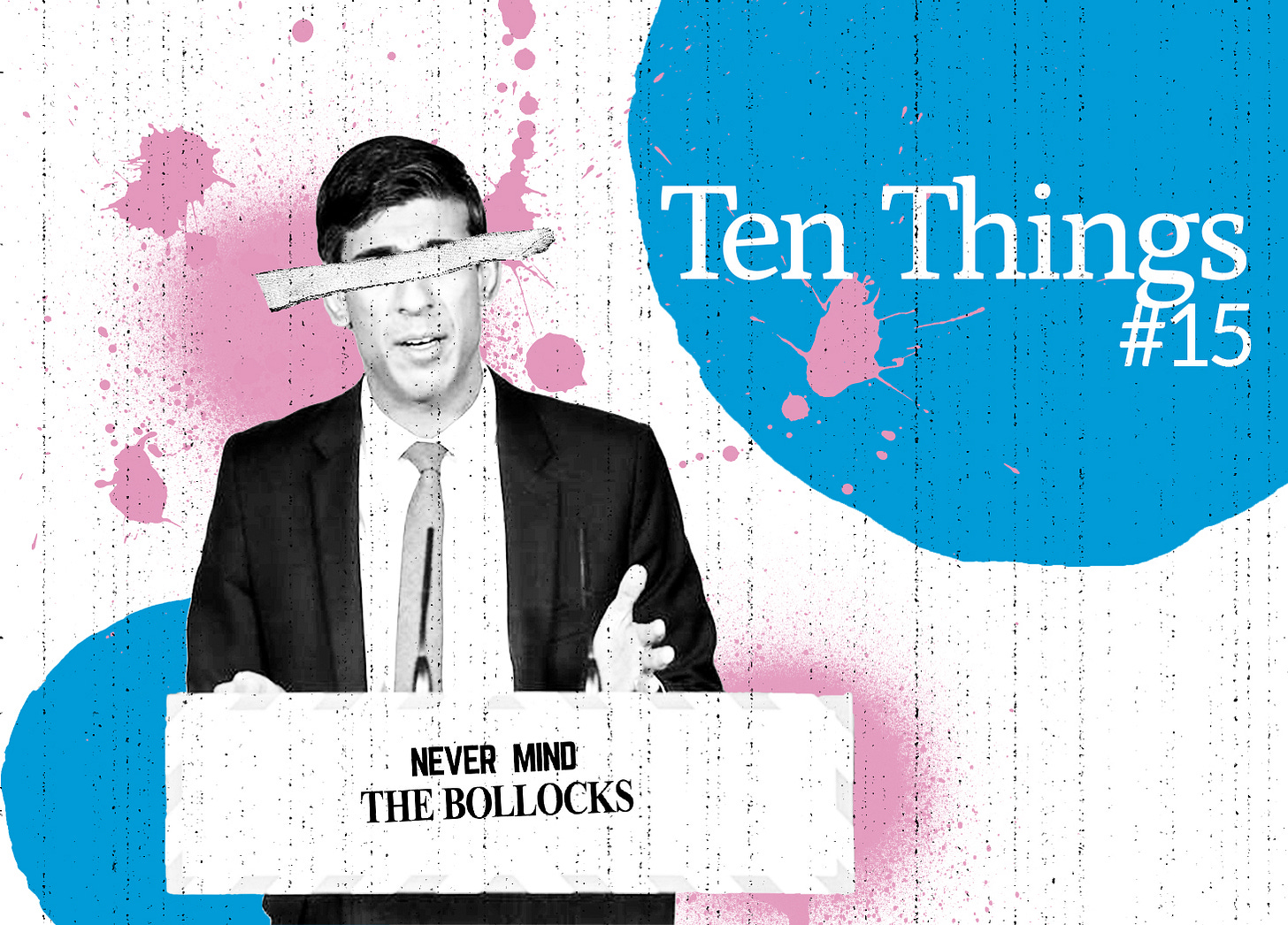Ten Things #15: ANARCHY IN THE UK
GH on the election, scandal, Simon Kuper's Good Chaps and Greg Sheridan's good omen.
1/ The UK, where I've put in for a few days, has a big new government, a proportionally shrunken opposition, and even spellcheck seems to know what's going on because it keeps turning Rishi Sunak into 'Rishi Sunk'
2/ The atmosphere? I wish I could report a state of national resolve, but the overwhelming sense is of fatigue shading into apathy 2/ The atmosphere? I wish I could report a state of national resolve, but the overwhelming sense is of fatigue shading into apathy
- the kind of dutiful sleepiness one gives to putting the rubbish out on bin night. After fourteen years of chaos and retreat, nobody is buying what the Tories are selling. It’s like John Howard said: ‘Sooner or later, the public works you out.’ Trouble is, the Brits have caught up so belatedly. Their country doesn’t have enough crew and the toilets don’t work.
Actually I liked this bulletin board at the station yesterday morning because of the implied distinction: there may be ‘no working toilets’ but as a consolation they are working toilets in potentia.
3/ I was reminded of last May when Sunak took The Australian’s Greg Sheridan on an ‘exclusive tour of number 10’, which involved lots of vision of Sheridan talking and Sunak feigning attention. Sheridan came away with a massive boner from ‘the sheer, shimmering surface of a politician of genuine depth and consequence’ who was ‘making an unexpected contest of British politics’ offering the Tories a 'road to victory.’ This confirmed Sunak’s doom, because Sheridan is reliably wrong about everything. And even seasoned observers have been amazed at Sunak's ineptitude. As a devotee of The Producers, I enjoyed this in Private Eye.
4/ For a deeper dive, I commend you to Tim Shipman’s tour d’horizon of British politics on Andrew Sullivan’s The Weekly Dish
, not least for an excellent joke about the difference between the products of Britain’s elite public schools, Eton, Harrow and Winchester: when a woman wants to sit down at a party, the Wykehamist tells the Harrovian to get her a chair and the Etonian sits in it.
5/ But the most damning testament may be the new title by my friend Simon Kuper of the FT. Good Chaps is an absolute grenade of a book, tracking the steady decline of British political morals to the extent where only twelve per cent of Britons have faith in political parties and, frankly, they seem naive. Kuper argues that the UK was once bound by unspoken codes and tacit restraints among the ‘Good Chaps’ drawn to office and service. Their erosion began with Thatcher’s exaltation of the free market: ‘Thatcher believed in public service. Yet she thought that the highest calling for other Britons was business. To get rich became glorious.’ At the same time, party membership at branch level was dwindling: ‘This meant that local parties were going from profit centres to cost centres. Instead of seeing funds to party headquarters, they now needed funds from HQ to survive. But where was HQ supposed to get the money?’ Why, the free market of course!
6/ The answer was first provided by the fall of Communism: ‘A small group of people, notably in the post-Soviet nations, grabbed the collapsing states’ assets for themselves. From the 1990s, many of these people moved to London. They bought the stucco homes in Kensington where the Good Chaps’ grandparents had lived…When they started making enquiries around Westminster, they were amazed to find how cheap chaps were.’ Two decades on, and British politics is drowning in donated money. As Kuper observes: ‘Many Tories are cheerleaders for capitalism who are strangely naive about what actual capitalists want from them.’ Nobody was more venal than the ultimate chancer, Boris Johnson, who ‘craved money but hated asking for it’, and who Sheridan inevitably took for ‘the right leader for Britain at this fantastically conflicted time.’
7/ Political donations in the UK are uncapped. There is a ‘fit and proper person’ test for owning a football club but not for enriching a political party. Why did the Tories fall in with Brexit, that massive project of national self-harm? Because in it, Johnson found the tastiest donor bait, and in the process expedited the replacement of the Good Chaps by the Rich Chaps - the likes of Arron Banks, Peter Virdee , Lord Bamford , Crispin Odey, Michael Hintze, Frank Hester, Paul Marshall, and Julio Velutini. The Rich Chaps were motivated either by a crazed libertarianism, by the entrepreneur's opportunity for personal enrichment from national chaos, or by the arriviste's desire for vengeance on last vestiges of establishment norms. Because as Kuper observes: ‘They regarded the Good Chaps as an unelected Remainer establishment, “the Blob” - the British version of what Turks and Trumpets called “the Deep State”.’
8/ And yet, and yet…a truly depressing feature of British life is that Johnson still walks abroad without two paper bags over his head (one in case the other falls off). A nation that set such store by propriety and precedence, that once reeled from scandal - Marconi, Profumo, Vassall, the Cambridge Spies, the Lavender List, Rinkagate - has grown eerily unshockable. As The Economist’s Bagehot points out this week, in the context of a Sunak aide revealed to have bet on an election date with probable insider knowledge: ‘In Westminster scandals are never exposed. They are simply noticed.’
9/ This seems to go to something more than mere national malaise, and that the allegation of corruption has lost utility because people are too busy looking for that elusive crew or waiting for a working toilet - as at the British Library, where I was working yesterday.
Maybe it’s akin to that perverse impact of publishing CEO salaries, which was meant to conduce to accountability, but somehow eroded social norms into the bargain. CEOs were disinhibited by the sight of their peers backing the truck up; they benefited by the evidence of collective greed because it obscured their individual greed. Sir Keir Starmer can now excuse his seemingly ceaseless cadging of freebies on grounds that the necessary disclosures have been made, which one needs reminding is not really the point. But if you brazen it out, attention will soon shift to another shameless sponger, and you’re off the hook. Boris set the example: if you are a stranger to shame, there is a lot in public life you can get away with. Continuing the tradition is Nigel Farage, the unflushable turd of British politics, who has now won a seat by raving about the Tory 'corruption' that never used to worry him.
10/ Anyway, good luck to Starmer, who on all we know will need it. One can only hope that Greg Sheridan declares the UK’s fifty-eighth prime minister a disaster. Oh, wait a minute: he already has.











Still remember Sheridan defending the Santa Cruz massacre, arguing “even genuine victims concoct stories”.
It's been wonderful to read in recent months that you are on good terms with Tom Holland and Simon Kuper - I'm an ardent fan of both.
My occasional and fleeting visits to the UK in the last 15 years have been focused on central London. Each time I go, the place feels more venal, corrupt and tired. It's very sad and there's an undercurrent of shapeless globalism in London that is even more pronounced than in other major financial and tourist centres.
British declinism is a trope that predates Orwell's 'Lion and the Unicorn', but it does appear to be gaining pace. As happens with many bankruptcies, things happen very, very slowly...and then very, very fast.